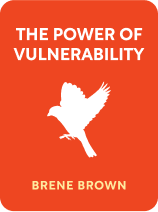

This article is an excerpt from the Shortform book guide to "The Power Of Vulnerability" by Brené Brown. Shortform has the world's best summaries and analyses of books you should be reading.
Like this article? Sign up for a free trial here .
What are the three aspects of Brené Brown’s wholehearted living program? Why are love, belonging, and vulnerability essential to living wholeheartedly?
In Brené Brown’s lecture The Power of Vulnerability, she discusses the three aspects of wholehearted living: love, belonging, and vulnerability. To Brené Brown, love removes the pressure of adhering to cultural and societal demands, belonging is the desire to be a part of something larger than ourselves, and vulnerability is the willingness to share your authentic self, no matter the consequences.
Continue reading to learn about the three aspects of Brené Brown’s wholehearted living.
The Three Aspects of Wholehearted Living
There are three aspects to Brené Brown’s wholehearted living: love, belonging, and vulnerability.
Love
Love is a deep connection that operates on respect, affection, and kindness. It isn’t something that you can simply offer or receive, but it requires cultivation and growth over time. It occurs when you allow your most vulnerable self to be seen, developing a truthful relationship in the process.
You can only love someone else as much as you love yourself. If you don’t believe that you’re loveable, you will put up walls that will prevent others from developing sincere relationships with you. The root of self-loathing is shame, and, if you allow it to dictate your life, you won’t have the capacity to love or be loved.
Love removes the pressure of adhering to cultural and societal demands. It allows you to live your most authentic life with someone who values you for who you are, not who they expect you to be, removing shame in the process. With shame out of the equation, scarcity culture can’t survive because it no longer has a method of controlling your behavior.
Parenting and Self-Love
Many parents argue that they don’t need to love themselves to love their children. However, without self-love, it’s nearly impossible to interact with your children without passing your negative emotions on to them, especially during triggering events.
For example, if you were bullied in school because you couldn’t afford designer clothes, you may tell your child to wear nicer clothing to “protect” them from the bullying you experienced. Instead of teaching them to have self-worth, you’re effectively telling them that people will only like them if they dress and act a certain way, paving the way for the development of shame.
Belonging
Belonging is our intrinsic desire to be a part of something larger than ourselves. Often, we try to change our behavior to fit in based on other people’s expectations. However, this behavior is unfulfilling and creates more barriers to true belonging. It’s the result of fear and ties self-worth to acceptance by others, which can lead to shame.
For example, if you go to a party with the goal of “fitting in,” the success of your evening relies on the opinion of other people. If people don’t accept you, you may question what’s “wrong” with you, developing shame in the process.
True belonging requires that you share your authentic self with the world to connect with other people, linking your sense of belonging to self-acceptance. With self-acceptance, belonging comes from an authentic place and doesn’t tie your self-worth to the opinions of others.
For example, if you go to a party with the goal of “being authentic,” the success of your evening relies solely on your willingness to be vulnerable and honest. If people don’t accept you, you can still take pride in the fact that you accomplished your goal. Also, it may lead to the realization that these people aren’t the people for you.
Vulnerability
Vulnerability is the willingness to show up and share your authentic self while knowing that you have no control over the outcome of your interactions. Vulnerability removes defensiveness, promotes empathy, and bolsters creativity.
Both love and belonging require vulnerability because connection requires that you share your authentic self with others. Many associate vulnerability with weakness and push people away out of fear of rejection or ridicule. However, you can’t experience wholeheartedness without it.

———End of Preview———
Like what you just read? Read the rest of the world's best book summary and analysis of Brené Brown's "The Power Of Vulnerability" at Shortform .
Here's what you'll find in our full The Power Of Vulnerability summary :
- The 10 practices that you can use to embrace vulnerability and start living a wholehearted life
- Why thinking that you're never "enough" is dangerous
- The most common sources of shame and how to overcome them






